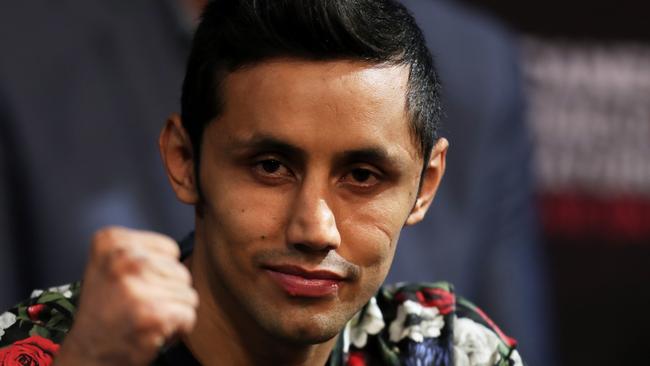A year in a coma, world champion boxer Moi Fuentes loses final bout
In his mid-30s, one time world flyweight boxing champion Moi Fuentes risked a final bout against an unbeaten knockout specialist.

OBITUARY
Moises “Moi” Fuentes Rubio. Boxer.
Born September 20, 1985, Mexico City; died November 24, aged 37.
-
Journalist Pierce Egan’s grave in London’s Highgate Cemetery is dilapidated and overgrown with creeping weeds. The headstone that recorded his death on August 3, 1849, is long gone, perhaps fallen over and itself buried by time.
If only Egan’s most famous utterance were similarly interred and forgotten. But, then, it was the perverse abbreviation of his words that was the problem. In 1810, Egan flippantly described primitive English bare-knuckle boxing as “the Sweet Science of Bruising”. Abridged as “the sweet science”, it has been used for 200 years to justify one commonly disadvantaged young man trying to render unconscious another.
With the highest murder rates on earth and almost half of its people living below the poverty line, Mexico offers few choices for the young. Moi Fuentes would have faced the traditional options: he could have run drugs, or violently stood over syndicate footsoldiers selling them on the streets, or boxed. There is a good reason Mexico produces a disproportionate number of world champions. In a rare articulate moment, former world heavyweight champion Mike Tyson spelled it out: “I think the poorer you are the better boxer you are. That’s why people in the slums, those are the guys that become fighters.”
Fuentes turned to boxing when he left school and by 20 was shaping up to be a champion. In his first professional bout in May 2007 he came up against the unnoticed David Solano, winning in two rounds. Fighting every few months he won his next 11 bouts, winning WBC and WBO flyweight titles along the way. In nine years he lost only two fights. But things changed on New Year’s Eve 2016 when he lost in Japan to unbeaten world champion Kosei Tanaka, 10 years his junior.
Six months after the Tanaka fight, Fuentes lost in a bruising 10-rounder to Ulises Lara. He won the hastily arranged rematch but then lost the next three bouts, all by knockout, two in the first round.
He had said before that last fight against Roman Gonzalez, the Nicaraguan world champion: “I am willing to die in the ring, so I am going to go all in.” Fuentes was paid $50,000 for the fight – about twice the average annual wage of his countrymen. He turned 33 five days later and sensibly, after 36 fights, gave it away while still in front. How much in front might be disputed: Gonzalez threw 390 punches that night, of which 145 landed. Older and slower, Fuentes landed only 47 punches out of 244.
We are all aware of the collective damage to the brains of AFL and rugby league players, and such a pummelling should make us wince. On hearing of Fuentes’s death the AMA said: “Until all boxing is banned, the AMA continues to call for tougher rules to minimise harm.”
Fuentes was the sole provider for his wife, Janine, and sons Moises, 7, and Santiago, 5. So he did what so many do and signed up for another fight. On October 16 last year he entered the ring to fight Mexican up-and-comer David Cuellar, 19, who boasted an ominous 20-0 record with 13 KOs. It started badly.
Cuellar landed a few jabs and some killer left hooks, leaving Fuentes’s face puffy. In the third round, Cuellar almost floored his opponent. By round five, Cuellar was so dominant and Fuentes so powerless to defend himself that even WBC president Mauricio Sulaiman, who was ringside, urged Fuentes’s corner to throw in the towel. But the bell sounded for the sixth and Fuentes bravely approached his opponent, once more “willing to die in the ring”. Both Cuellar’s fists went to work and at 2.11 another left jab knocked Fuentes down and out.
Fuentes was rushed to hospital and doctors in Cancun operated on him to remove a blood clot on his brain. He never regained consciousness and was moved to a hospital near his home. A year and 39 days later, Sulaiman announced that the world had lost “a warrior who fought to the last breath”.
I was reminded of the words of Hugh McIlvanney, who in 1980, in one of the most elegant passages of sport writing, described the fights and times of brave Welsh boxing champion Johnny Owen who, skilled but fragile, fought Mexico’s Lupe Pintor for the world bantamweight title. Owen, at odds of 6-1, was willing to die trying and did.
McIlvanney wrote of his young friend: “It is his tragedy that he found himself articulate in such a dangerous language.”




To join the conversation, please log in. Don't have an account? Register
Join the conversation, you are commenting as Logout